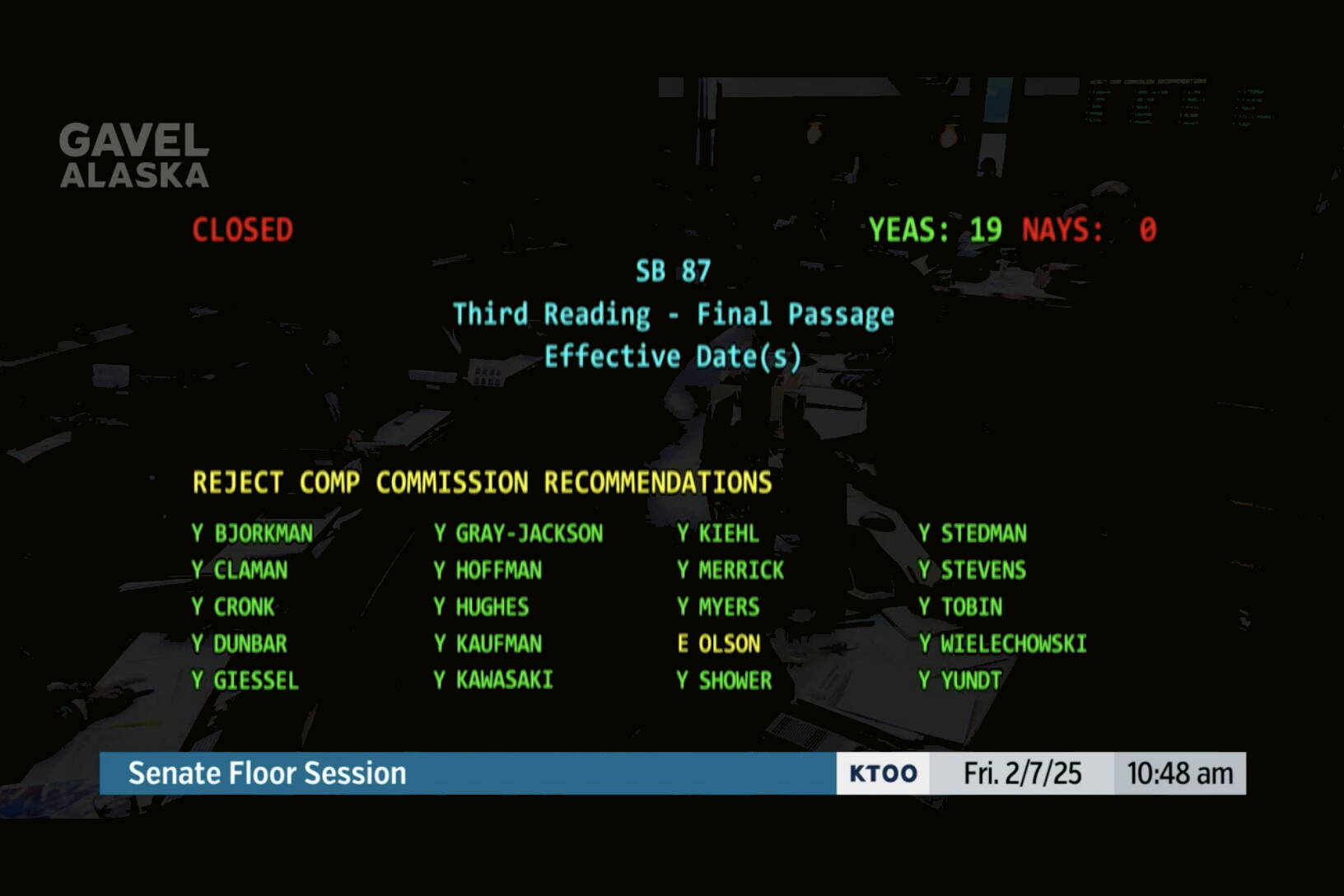The Alaska Senate essentially rejected giving themselves and other state leaders automatic pay raises linked to inflation with the unanimous passage of a bill Friday that rejects a commission’s recommendation to implement such raises.
Senate Bill 87 rejects recommendations made Jan. 29 by the three-member State Officers Compensation Commission that would adjust salaries every two years for the Legislature, Gov. Mike Dunleavy and top officials at state agencies to match the Consumer Price Index — up or down — after the 2026 state election. The recommendations automatically take effect unless the Legislature and Dunleavy pass a law negating the decision.
“As we all know we’re faced with a substantial budget deficit that we as the appropriators have to carefully consider any increment,” Senate Rules Committee Chair Bill Wielechowski, an Anchorage Democrat, said during Friday’s floor debate. “It is important that we address the many challenges that are facing Alaskans today.”
The bill will next be considered by the House. House Speaker Bryce Edgmon, a Dillingham independent, said Friday his majority caucus is likely to move quickly in matching the Senate’s action.
State legislators receive $84,000 per year in salary, plus per diem that is about $37,000 for all but Juneau’s three state legislators. The governor currently is paid about $176,000 per year, the lieutenant governor about $140,000 and state commissioners about $168,000 per year.
Salary hikes for politicians are frequently controversial and Alaska’s lawmakers were subject to a barrage of criticism when a 67% pay raise was approved by the commission in March of 2023. The change that eventually became law also included smaller increases for the governor, lieutenant governor and commissioners.
Supporters of the increase noted executive branch salaries had not increased since 2011, while legislators noted their former $50,400 salary has been unchanged since 2010. However, a major focus of critics was the process involved since all five members of the commission, which had earlier recommended no change in pay for legislators, were replaced by Dunleavy before a new recommendation adding those raises was approved.
Lynn Gattis, a former state legislator and member of the salary commission, told the Alaska Beacon last week the inflation-adjusted recommendation would allow for gradual, small raises instead of the large bump that occurred in 2023 — and also could potentially see pay go down if the CPI declines.
Salaries for other state employees are also a point of contention since a comparative study of state salaries still hasn’t been released by the Dunleavy administration.
The $1 million study approved by the Legislature in 2023 was due last June and intended to evaluate the competitiveness of state salaries, especially given widespread workforce shortages including state government vacancy rates that have exceeded 20%. But Dunleavy’s office stated it was ordering additional research and has denied requests from legislators, union leaders and the media to make the draft report available.
The results could provide leverage to employees’ unions seeking higher wages — or to management opposing them — with many of those talks in progress. Officials seeking the release of the draft said the administration’s new timeline of a report being completed by March 31 — but not necessarily released publicly then — is unhelpful since the next fiscal year when salary adjustments take effect starts July 1.
Sen. Bert Stedman, a Sitka Republican who co-chairs the Senate Finance Committee, said during Friday’s floor debate giving top officials automatic hike adjusted to inflation is “the wrong thing to do” when many other state workers don’t have such guarantees.
“We recognize that there’s a lot of inflation pressure the last couple of years,” he said. “Salaries across the state are being adjusted, but they’re not so inclined to have automatic escalators.”
• Contact Mark Sabbatini at mark.sabbatini@juneauempire.com or (907) 957-2306.

